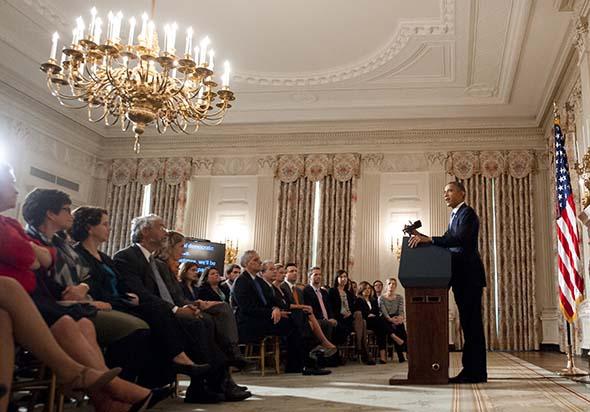At his Thursday press conference, President Obama declared, “There are no winners”—just before he proceeded to act like a man who had just won. The morning after the budget crisis ended, the president’s remarks were extensive and clear about who was to blame for the 16-day standoff that cost the economy roughly $24 billion, by one estimate.* The president outlined all that had been sacrificed—from slowed economic growth and higher deficits to America’s damaged credibility in the world. He suggested his opponents were too witless to avoid being cowed by bloggers and talk radio, and had risked the very American experiment our predecessors spent two centuries building. The public, which had overwhelmingly blamed Republicans, no doubt knew who he was talking about and who to blame. If it wasn’t clear, the president had a piece of advice for those Republicans: Rather than trying to “break” the government because they disagreed with him, they should “go out there and win an election.”
Well, that should settle them down.
The disconnect between what the president said about there being “no winners” and the way he behaved demonstrates that something important is missing from our public discourse: We need to come to an agreement about what we mean when we talk about winners and losers in politics.
The president’s remarks about winning echoed a statement from House Speaker John Boehner more than a week ago. “This is not some damn game,” said Boehner, slamming a copy of that morning’s Wall Street Journal on the lectern in which a White House aide had been quoted saying, “We’re winning.” Both men are appealing to a strong public sentiment that I hear a lot in emails, on Twitter, and in conversations with voters. What happens in Washington affects real people. That’s especially true with the government shutdown and sequestration. When the politicians, journalists, and other Washington dwellers talk about it—either in terms of raw numbers or in terms of which party is up or down—we risk losing the essential humanity at the center of the enterprise. When the public hears us talking in this way, they want to punch us in the nose.
They are right to want to do this. But there are some other considerations to take into account. First, this is a game. Not in the sense that it’s fun (though some people do find entertainment in politics), but in the sense that very high-stakes poker is still, at bottom, a game. If you don’t like the term game, then perhaps we should use the word contest. But whatever we call it, there are important elements of this drama that are gamelike.
The game is fueled, in part, by pure personal ambition to win that has little to do with the merits of the cause being debated. Perhaps we’d prefer every debate to be a contest of ideas in which each side weighed the policy prescriptions the other wanted, but that’s not the way it is. And it’s not the way the Framers envisioned it either. “If men were angels, no government would be necessary,” wrote James Madison, in that Federalist 51 passage you could have seen me winding up to quote from a mile away. Government, he wrote, “the greatest of all reflections on human nature,” is full of all the messy aspects of it: emotion, greed, pride, and lots of other messy stuff.
A lot of good policy rides on the back of human ambition. Most great legislation exists in part because of it. If you believe in some particular value or policy, you’d better hope there is an audacious politician out there willing to champion it.
Winning is also a perfectly appropriate way to talk about the clashes of the day because these battles are also sometimes a legitimate contest of ideas, which means you want your side to win so that your policy idea becomes law. The person who wins, whether through guile or persuasive argument, gets the idea enacted. Just because some politician or party is winning doesn’t mean that others don’t also stand to benefit. In politics that’s necessarily the case.
Shutdown 2013, however, was less about policy than it was about raw power. Obamacare may have provoked the fight, but the mess quickly swerved into some other lane and then the disputes became about who was or was not willing to negotiate with the other. The quintessential nature of this battle—a clash of power between two sides—makes the “winner” and “loser” language all the more apt. It would be better if we didn’t have stupid fights about the basic functioning of government, but if we are going to have those battles, we should use the appropriate words to describe them.
That’s the real reason there’s so much talk about winning and losing. It is the shorthand conversation about power in any high-stakes contest. That is the way lawmakers, strategists, policy analysts, and journalists talk about the process of governing. It is blunt and messy and sometimes crass, but to gloss over it or pretend it doesn’t exist is to tell an incomplete story. So, for example, what President Obama was doing in his remarks Thursday might have sounded like a high-minded appeal to reason and fair dealing, but the message that hit you in the gut was to highlight his victory. He was putting the Republicans in the stockade, and pointing at them on national television so that he might gain even more leverage over them in the coming legislative battles. The president thinks he won, and he wants to keep on winning.
Correction, Oct. 18, 2013: This article originally said that the standoff cost taxpayers roughly $24 billion. The estimate was for the overall economic cost. (Return.)
